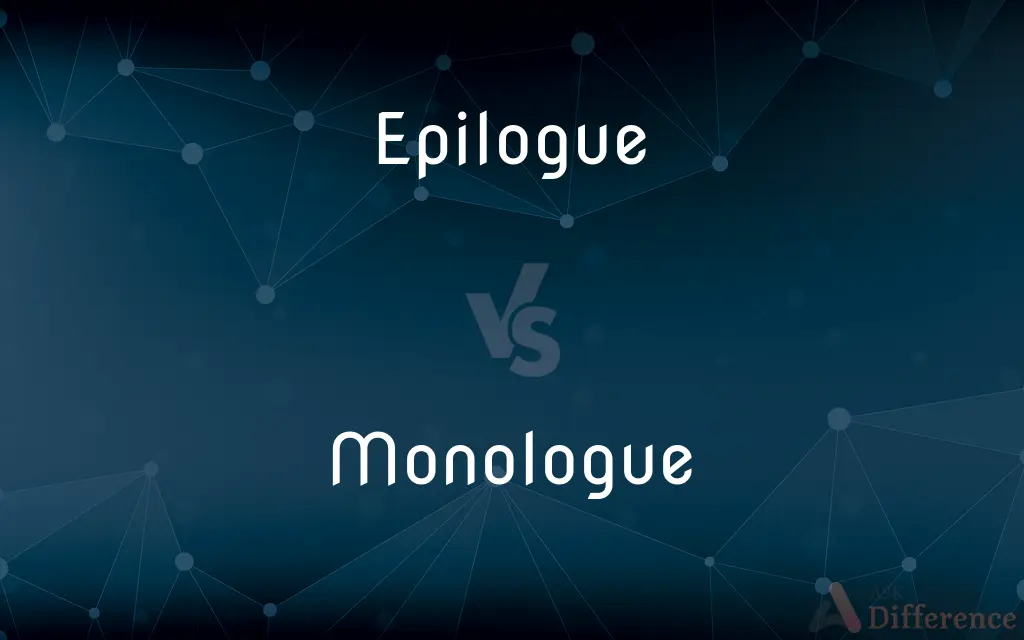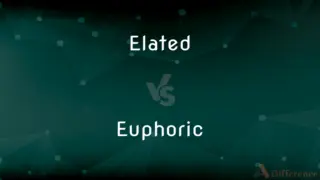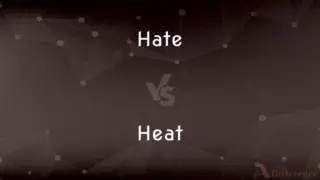Epilogue vs. Monologue — What's the Difference?

Difference Between Epilogue and Monologue
ADVERTISEMENT
Compare with Definitions
Epilogue
An epilogue or epilog (from Greek ἐπίλογος epílogos, "conclusion" from ἐπί epi, "in addition" and λόγος logos, "word") is a piece of writing at the end of a work of literature, usually used to bring closure to the work. It is presented from the perspective of within the story.
Monologue
In theatre, a monologue (from Greek: μονόλογος, from μόνος mónos, "alone, solitary" and λόγος lógos, "speech") is a speech presented by a single character, most often to express their thoughts aloud, though sometimes also to directly address another character or the audience. Monologues are common across the range of dramatic media (plays, films, etc.), as well as in non-dramatic media such as poetry.
Epilogue
A short poem or speech spoken directly to the audience following the conclusion of a play.
Monologue
A long speech by one actor in a play or film, or as part of a theatrical or broadcast programme
He was reciting some of the great monologues of Shakespeare
He had a long and exacting monologue at the end of the film
Epilogue
The performer who delivers such a short poem or speech.
ADVERTISEMENT
Monologue
A lengthy, uninterrupted speech by a single character, as in a play or novel.
Epilogue
A short addition or concluding section at the end of a literary work, often dealing with the future of its characters. Also called afterword.
Monologue
A literary composition in monologue form.
Epilogue
An event which reflects meaningfully on a recently ended conflict or struggle.
Monologue
A continuous series of jokes or comic stories delivered by one comedian.
Epilogue
A short speech, spoken directly at the audience at the end of a play
Monologue
A long speech made by one person, often monopolizing a conversation.
Epilogue
The performer who gives this speech
Monologue
To give or perform a monologue.
Epilogue
A brief oration or script at the end of a literary piece; an afterword
Monologue
To address a monologue to.
Epilogue
(computing) A component of a computer program that prepares the computer to return from a routine.
Monologue
A long speech by one person in a play; sometimes a soliloquy; other times spoken to other characters.
Epilogue
(transitive) To conclude with an epilogue.
Monologue
(comedy) A long series of comic stories and jokes as an entertainment.
Epilogue
A speech or short poem addressed to the spectators and recited by one of the actors, after the conclusion of the play.
A good play no epilogue, yet . . . good plays prove the better by the help of good epilogues.
Monologue
A long, uninterrupted utterance that monopolizes a conversation.
Epilogue
The closing part of a discourse, in which the principal matters are recapitulated; a conclusion.
Monologue
To deliver a monologue.
Epilogue
A short speech (often in verse) addressed directly to the audience by an actor at the end of a play
Monologue
A speech uttered by a person alone; soliloquy; also, talk or discourse in company, in the strain of a soliloquy; as, an account in monologue.
Epilogue
A short passage added at the end of a literary work;
The epilogue told what eventually happened to the main characters
Monologue
A dramatic composition for a single performer.
Monologue
Speech you make to yourself
Monologue
A long utterance by one person (especially one that prevents others from participating in the conversation)
Monologue
A (usually long) dramatic speech by a single actor
Share Your Discovery

Previous Comparison
Elated vs. Euphoric
Next Comparison
Hate vs. Heat














































